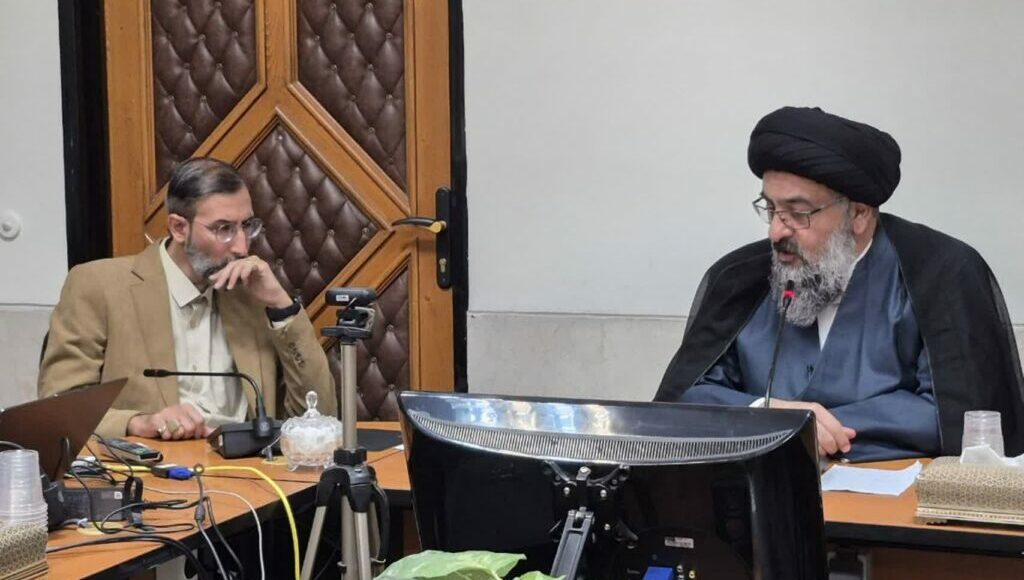Fourth Specialized Session on the Relationship Between Religion, Seminaries, and Music: The Role of Jurisprudence and Seminaries in Music Governance
The fourth session of the specialized series titled “The Relationship Between Religion, Seminaries, and Music,” focusing on “The Role of Jurisprudence and Seminaries in Music Governance,” was organized by the Department of Virtual Space, Art, and Media of the Islamic Propagation Office of Khorasan Razavi, in collaboration with the Institute of Contemporary Jurisprudential Studies. The session featured Ayatollah Seyyed Mojtaba Nourmofidi, head of the Institute of Contemporary Jurisprudential Studies, as the keynote speaker, and Mohammad Javad Ostadi, head of the Department of Virtual Space, Art, and Media of the Islamic Propagation Office of Khorasan Razavi, as the academic secretary.
This series of sessions is designed to explore the scientific and jurisprudential dimensions of music and its relationship with religion, culture, and Islamic society, aiming to create a platform for scholarly dialogue among seminaries, academics, and art practitioners.
Music: From Historical Tradition to Contemporary Everyday Life
Ayatollah Nourmofidi, referencing the historical background of music in Islamic history, stated: “Since the Umayyad Caliphate, music became more widespread in society, and today, the situation is entirely different. Music is no longer a personal choice or confined to specific gatherings; with technological advancements, it has woven itself into the fabric of daily life, impossible to ignore even for a moment.” He emphasized the evolving role of music from the past to the present, adding: “Historical transformations demonstrate that music cannot be disregarded. Seminaries and the jurisprudential system must recognize these changes and provide appropriate responses.” He further noted that the advent of technology in the music industry has led to the emergence of diverse genres, styles, and functions, making its jurisprudential and governance examination more complex.
Music’s Multifaceted Roles in Social, Cultural, and Political Spheres
The head of the Institute of Contemporary Jurisprudential Studies highlighted the multidimensional roles of music, stating: “Today, music is deeply intertwined with the economy, politics, culture, and society. Economically, it creates employment for some; culturally, it has become a tool for storytelling and plays a role in shaping the identity of younger generations.”
He added: “Music can have contradictory functions: on one hand, it may promote violence and negative emotions, while on the other, it can foster hope, tranquility, and social cohesion. A clear example was observed during the twelve-day war, where committed artists, through producing valuable and epic musical works, significantly influenced the morale of the public, particularly Generation Z.”
According to Ayatollah Nourmofidi, without a precise understanding of music’s roles in society, policymakers and managers cannot devise effective strategies to guide and regulate this domain. Defining governance as encompassing policy-making, legislation, implementation, and oversight, he stated: “The Islamic Republic, as a system rooted in jurisprudence and religious rulings, must examine music’s place across all four levels.”
Regarding the role of seminaries in policy-making, he explained: “The core of policy-making in seminaries lies in jurisprudential inference. Historically, jurists have held diverse views on music. Some have deemed it absolutely forbidden, while others, by examining narrations and rational jurisprudential principles, have permitted it in specific cases.”
Diversity of Jurisprudential Perspectives on Music
Citing jurisprudential sources, the head of the Institute of Contemporary Jurisprudential Studies explained: “The book Wafi states that listening to songs with themes of paradise, hell, asceticism, and benevolence is permissible. Thus, jurists’ views on music vary. Generally, what is often deemed forbidden is lahwi (frivolous) music, meaning music that causes the listener to lose rational control and fall into a state of intoxication or heedlessness of God.”
He emphasized: “In jurisprudential inference and religious governance, the primary criterion remains reliance on rational principles and dynamic ijtihad. This principle should guide seminaries’ approach to all phenomena, including music.”
Concluding his remarks, Ayatollah Nourmofidi stated: “Understanding music in its various dimensions and clarifying its role in governance is an undeniable necessity. Neglecting this issue deprives seminaries of their effective role in guiding society culturally. Continued scholarly and structured dialogue between religious scholars and art practitioners is essential to establish a precise framework for policy-making, legislation, and oversight in the music domain.”
The Need for Integration Between Research and Policy-Making
In the final part of the session, Mohammad Javad Ostadi, the academic secretary, emphasized the objectives of these sessions, stating: “Music is a prevalent and pressing issue in our society, which cannot be addressed solely through academic research. A connection must be forged between seminary research, dynamic ijtihad, and cultural policy-making processes to ensure decisions align closely with social realities.”
He added: “The session on ‘The Role of Jurisprudence and Seminaries in Music Governance’ once again demonstrated that music is not merely an artistic matter but a multidimensional phenomenon encompassing economy, culture, politics, and society. In this context, the role of seminaries and Islamic jurisprudence in regulating and guiding this domain is pivotal and fundamental, achievable only through scholarly ijtihad and intelligent governance.”
